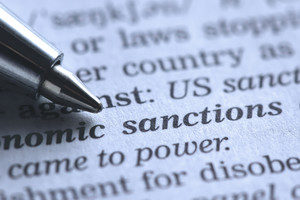 On April 15, 2021, the US announced a marked expansion of sanctions against Russia and President Biden issued a new Executive Order authorizing the imposition of yet more sanctions. The sanctions include restrictions on certain transactions involving Russian sovereign debt, as well as the designation of 46 individuals and entities implicated in Russia’s annexation of Crimea, foreign election interference and the SolarWinds cyberattack. The new Executive Order provides broad authority to impose additional sanctions should the Biden Administration decide to do so.
On April 15, 2021, the US announced a marked expansion of sanctions against Russia and President Biden issued a new Executive Order authorizing the imposition of yet more sanctions. The sanctions include restrictions on certain transactions involving Russian sovereign debt, as well as the designation of 46 individuals and entities implicated in Russia’s annexation of Crimea, foreign election interference and the SolarWinds cyberattack. The new Executive Order provides broad authority to impose additional sanctions should the Biden Administration decide to do so.
Executive Order 14024
Executive Order 14024 Blocking Property With Respect to Specified Harmful Foreign Activities of the Government of the Russian Federation, authorizes sanctions on a range of persons, including, among others, those operating in the technology and defense and related materiel sectors of the Russian Federation economy, and in any additional sectors of the Russian Federation economy as may be determined by the Secretary of the Treasury, in consultation with the Secretary of State.
The Executive Order also expands on earlier authorities, authorizing the imposition of sanctions against the spouse and adult children of sanctioned individuals. This provision appears to be an effort to address potential evasion of the sanctions through the transfer of assets to close relatives.
Russian Sovereign Debt
Under the authority granted by Executive Order 14024, the US Department of the Treasury’s Office of Foreign Assets Control (OFAC) issued a directive targeting certain transactions involving Russian sovereign debt. The directive prohibits US financial institutions, as of June 14, 2021, from either (1) participating in the primary market for “new” ruble and non-ruble denominated bonds issued by the Central Bank of the Russian Federation, the National Wealth Fund of the Russian Federation, or the Ministry of Finance of the Russian Federation; or (2) lending ruble or non-ruble denominated funds to those entities. The scope of the directive is relatively narrow, prohibiting only some and not all transactions involving the targeted entities. It is important to note as well that, absent other prohibitions, US banks may continue to engage in all other transactions with the three entities.
The sanctions on the three Russian financial entities are not subject to the OFAC Fifty Percent Rule. This exemption means that the directive’s restrictions are limited to transactions, such as loans or bonds, directly with the named entities and do not extend other entities in which the named entities may own a direct or indirect majority interest. Additionally, the directive does not prohibit US financial institutions from participating in the secondary market for Russian sovereign bonds. As noted above, the sanctions on the three entities become effective on June 14, 2021, 60 days after the issuance of the directive.
Targeted Sanctions
In addition to the above restrictions on Russian sovereign debt, the Biden Administration also designated 46 individuals and entities to OFAC’s Specially Designated Nationals and Blocked Persons (SDN) List based on their involvement in Russia’s destabilizing operations abroad. These designations mean that US persons are generally prohibited from undertaking transactions involving the SDNs, and any property or interests in property of the targeted persons that come within US jurisdiction are frozen. The Executive Order was issued to address a variety of Russia-related concerns. A press release issued by the Treasury Department when the Executive Order was issued cites to all of the following: “undermining the conduct of free and fair elections and democratic institutions in the US and its allies and partners; engaging in and facilitating malicious cyber activities against the US and its allies and partners that threaten the free flow of information; fostering and using transnational corruption to influence foreign governments; pursuing extraterritorial activities targeting dissidents or journalists; undermining security in countries and regions important to the US’ national security; and violating well-established principles of international law, including respect for the territorial integrity of states.”
The April 15 sanctions package indicates the Biden Administration’s willingness to address what it sees as problematic behavior from Russia. It is unclear if additional sanctions are planned. However, in a public statement on the sanctions, US Secretary of the Treasury Janet Yellen described the measures as “the start of a new US campaign against Russian malign behavior,” alluding to the possibility that there could, in fact, be additional designations.

